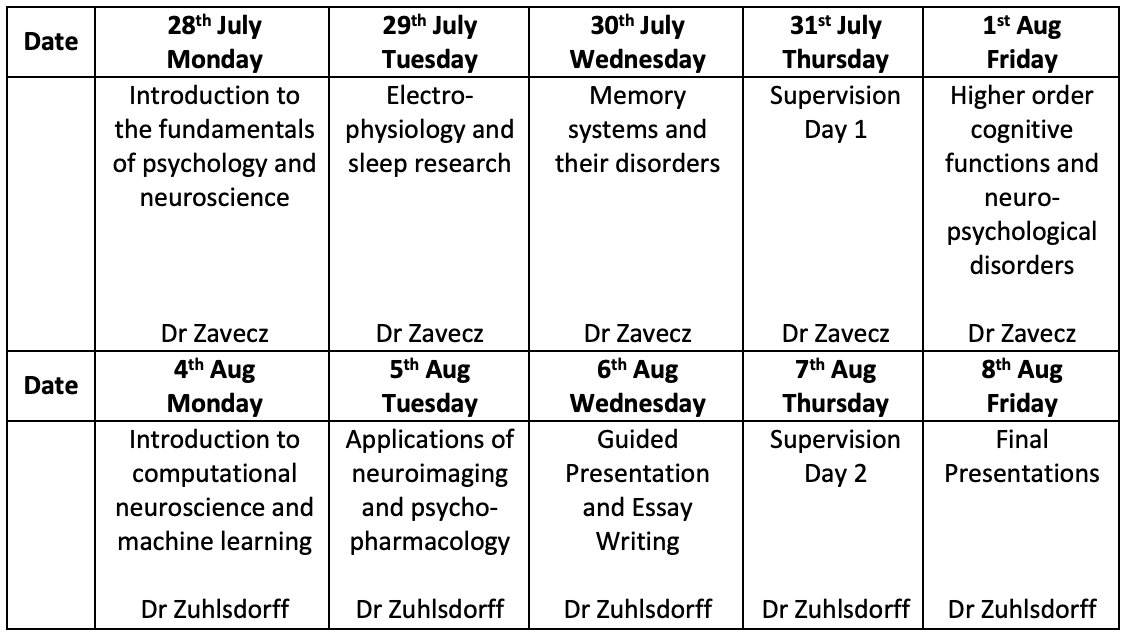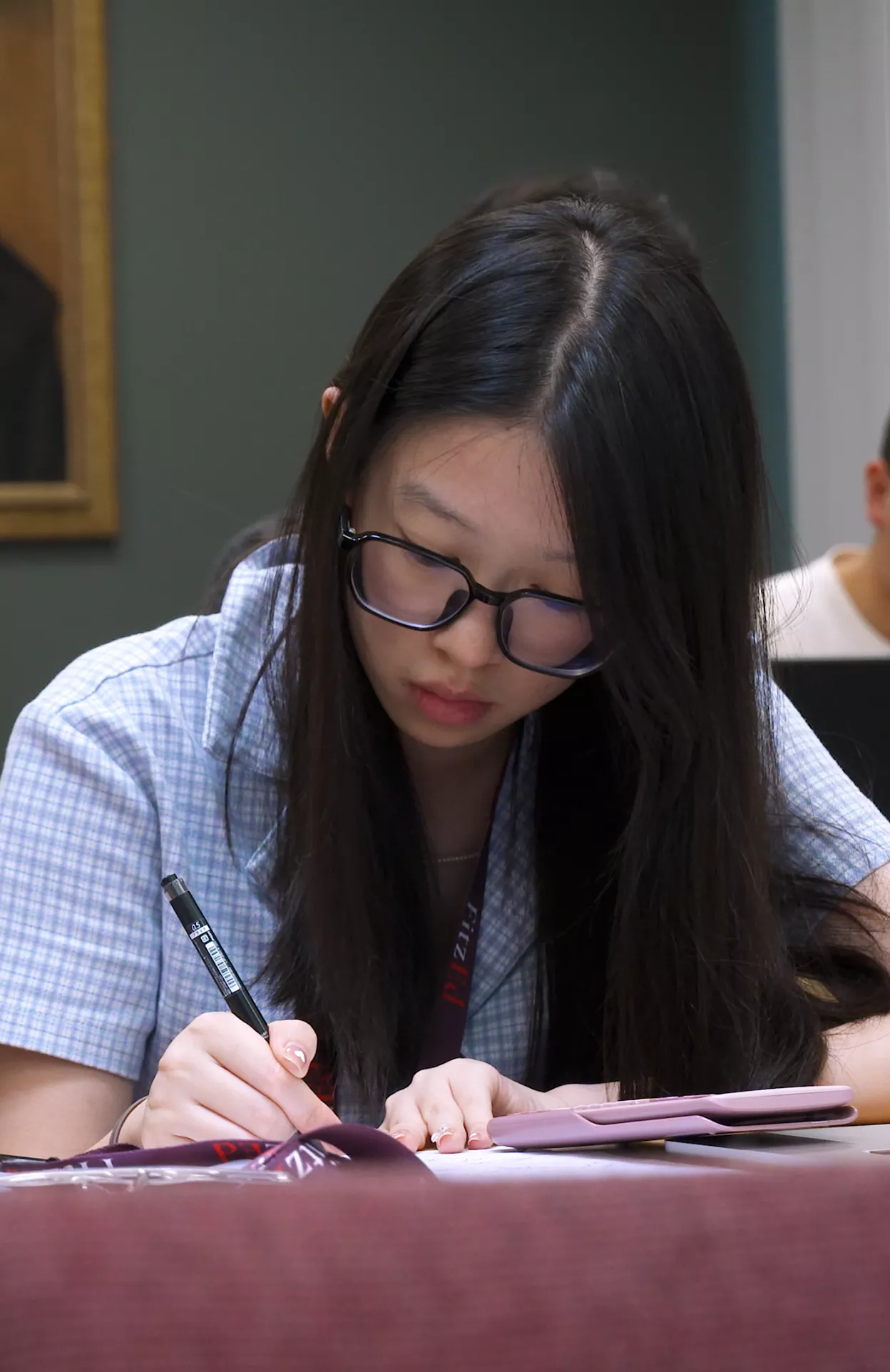Courses on Offer
You will experience the world-leading teaching offered at Fitzwilliam, by the same academics who are responsible for educating our own undergraduate students. The programme and the courses are designed to provide you with a flavour of undergraduate study at Cambridge, an opportunity to explore your chosen topics beyond that covered in your school curriculum and to help you prepare for your further university studies abroad.
The list of courses offered in each programme, together with an overview of the content of each course is listed below. For a detailed description of the syllabus of each course see the course brochures.
Programme 1 (13th - 26th July 2025)
-
Biology: Microbiology & Pathogen Evolution
Course Instructor(s): Dr Marta Matuszewska and Dr Christopher Ruis
This course provides an in-depth exploration of the genetic and evolutionary dynamics that drive pathogen adaptation and resistance, focusing on Staphylococcus aureus and other significant bacteria. Through lectures on molecular epidemiology, bacterial genomics, and phylogenetic analysis, students will gain foundational knowledge in understanding pathogen evolution. With a blend of theoretical concepts and hands-on activities, including guest lectures and group projects, participants will be equipped to analyse genetic data and explore real-world implications in public health and disease management.
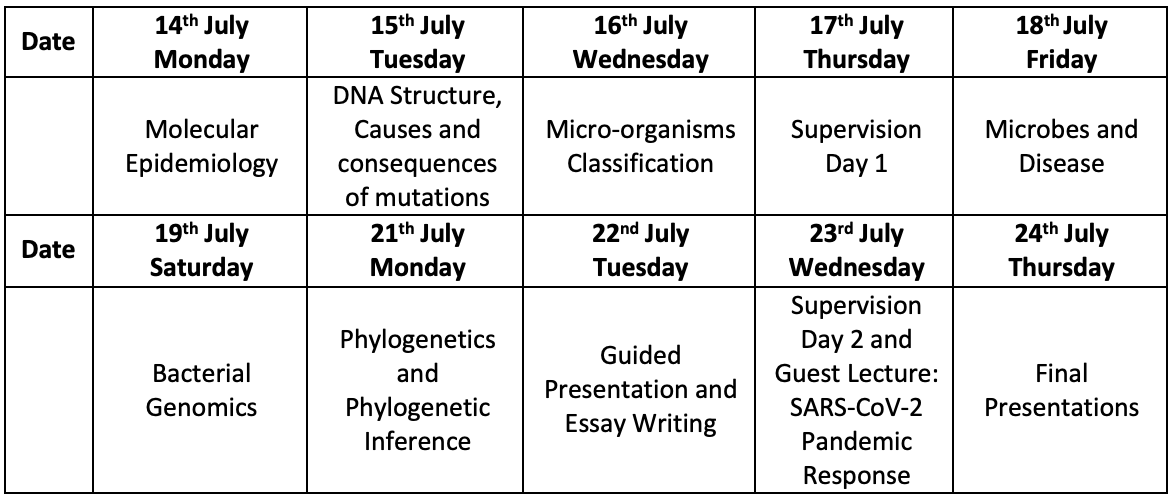
-
Physics: Special Relativity and Quantum Mechanics
Course Instructor(s): Dr Joao Rodrigues
The motion of particles at speeds close to the speed of light is described by equations that are very different from those that we apply to study the motion of the objects in our daily life, such as the planets around the Sun. Special Relativity provides the theoretical framework to study those fast moving particles. We shall study phenomena such as the time dilation, length contraction and the famous twin paradox, which have no counterpart in the classical theory.
And let us explore the Quantum World. The atomic and subatomic particles behave in a way that for us, used to the certainties of Classical Dynamics and Electromagnetism, is unambiguously strange. Quantum Mechanics suggests there is an essential randomness in quantum phenomena and the best theory we have, based on the wave function and Schrodinger equation, can only predict the probabilities of events to occur. Such peculiarities of the theory were not appealing to everyone. We shall look at how Einstein objected to the standard formulation of Quantum Mechanics and how his ideas led to new developments.
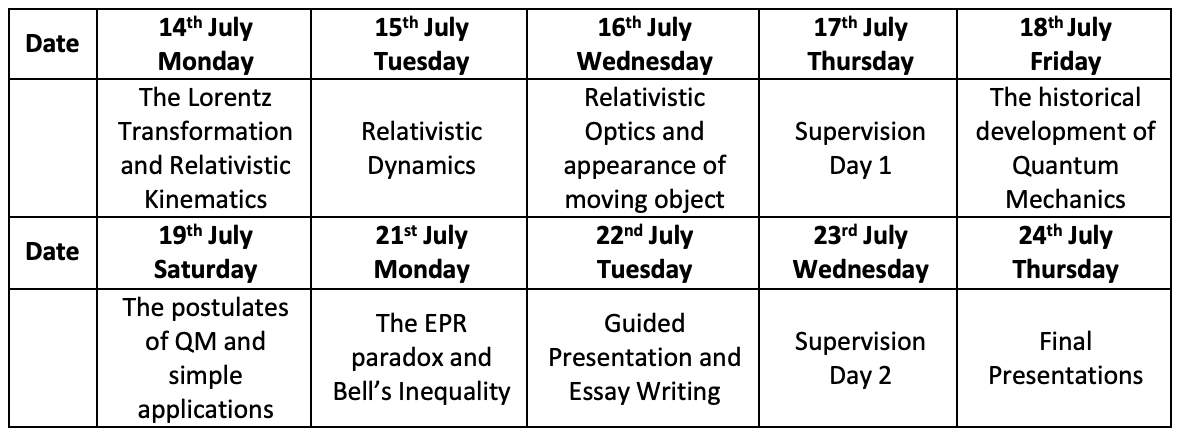
-
Chemistry
Course Instructor(s): Dr Andrea Chlebikova and Dr Peter Bolgar
This course lets participants explore advanced topics in physical and organic chemistry, each of which are fundamental to your studies of a chemistry degree. The course is built on concepts that you will be familiar with from school curriculum. We will quickly extend your knowledge in the fields of atomic and molecular orbital theory, thermodynamics, kinetics and organic reactivity to give you a significant head start in your university education. You will be able to practice your experimental skills as well through a practical class in physical chemistry. We are looking forward exploring the highlights of first year undergraduate-level Chemistry curriculum with you!
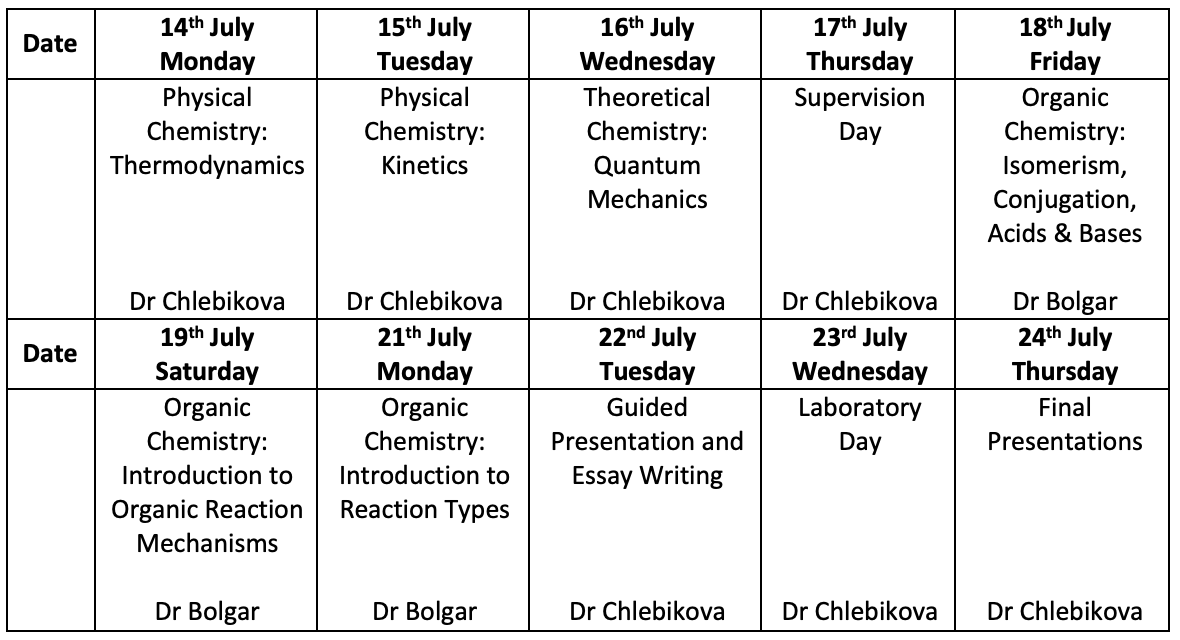
-
Mathematics for the Natural Sciences, Option 1
Course Instructor(s): Dr Stephen Sawiak
This exciting and challenging mathematics course gives a rapid tour from the fundamentals of calculus (differentiation and integration) up to first-year University level with advanced applications including power series expansion of functions, Fourier series and the extension of integration into multiple dimensions and non-Cartesian coordinate systems. The pace of this course will be fast and most suitable for those with already some familiarity with the basic concepts of calculus who are keen for a preview of University level mathematics made accessible to those of a bright high school level.

-
Mathematics for the Natural Sciences, Option 2
Course Instructor(s): Mrs Serena Povia

-
Engineering: Sustainable Vehicles
Course Instructor(s): Dr Andrea Giusti and Dr Daniel Fredrich
The module we propose focuses on the design of new vehicles with sustainability at the centre of all engineering choices. The student will learn the fundamentals of vehicle dynamics, aerodynamic forces, electrification and new vehicle concepts. Theoretical lectures are paired with practical sessions which will guide the student towards a conceptual design of the vehicle of the future.
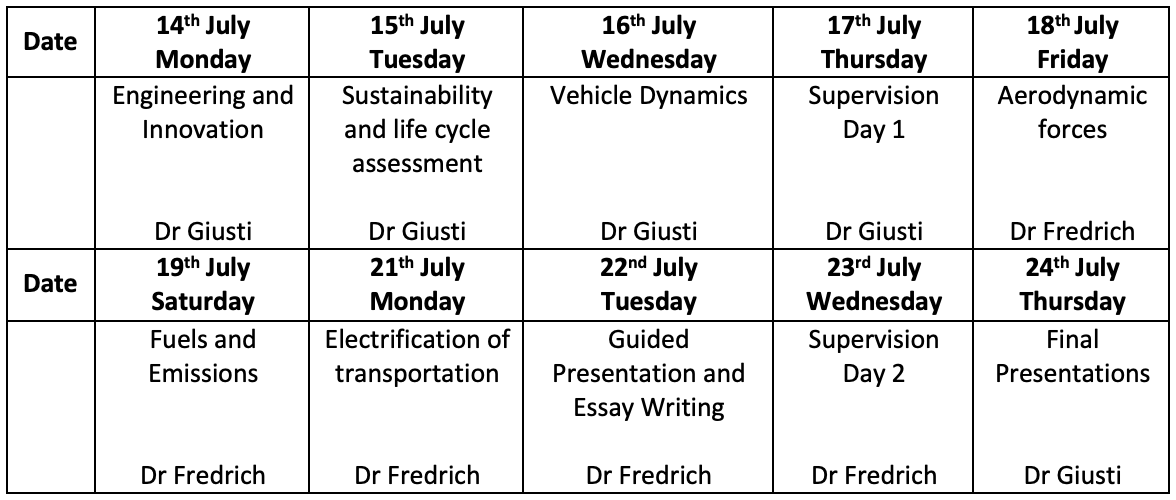
-
Psychology and Neuroscience, Option 1
Course Instructor(s): Dr Aude Rauscent and Dr Alexandra Krugliak
Have you ever wondered how humans think? In this course, you will be introduced to fundamental concepts in Psychology and Cognitive Neuroscience.
At the lectures you will explore the fundamental mechanisms of the brain which controls various functions, including thought, emotion, motor skills, vision, and motivation. It is a complex organ composed of approximately 86 billion neurons - nearly the same number as the stars in the Milky Way! You will also learn about advanced techniques used to assess psychological and cognitive functions.
As part of the course you will develop key skills necessary for reading scientific articles effectively and performing literature searches. You will also practice how to introduce and justify a hypothesis and how to structure the narrative of a research question.
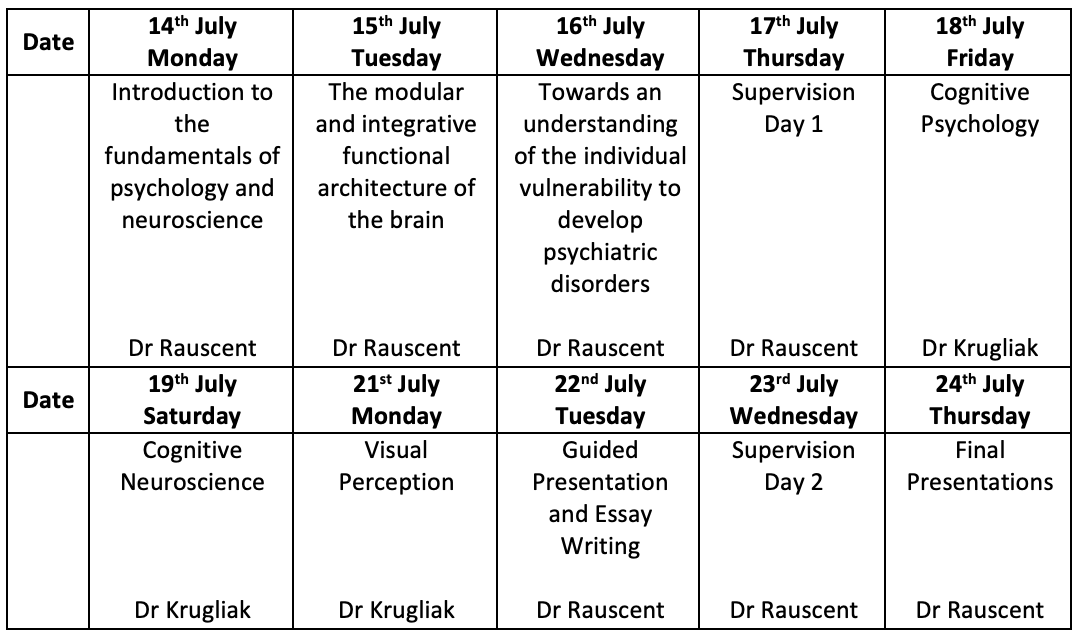
-
Elements of Mathematical Economics
Course Instructor(s): Dr Vasileios Kotsidis
This course explores some fundamental notions and results that are of special importance of economic analysis. It begins by considering elements of set theory, analysis, optimisation calculus, and statistics. It then applies them to construct a series of progressively more elaborate logical statements which form the basis of formal choice under risk. The result is a robust and analytically tractable approach to reasoning about uncertainty.

-
Computer Science: Artificial Intelligence
Course Instructor(s): Dr John Fawcett
Artificial intelligence (AI) and machine learning (ML) have featured in the news regularly in recent years as technology continues to transform our social and work lives. This course explores the problems that we can solve with AI and ML and takes a deep dive into how we create them, including the key maths and algorithms. It moves from narrow-focused classical AI systems to solving open-ended problems that humans cannot necessary solve. Looking beyond today's AI and ML systems, the course looks at the challenges that the technology has still to overcome, posturing you to understand the next wave of developments.
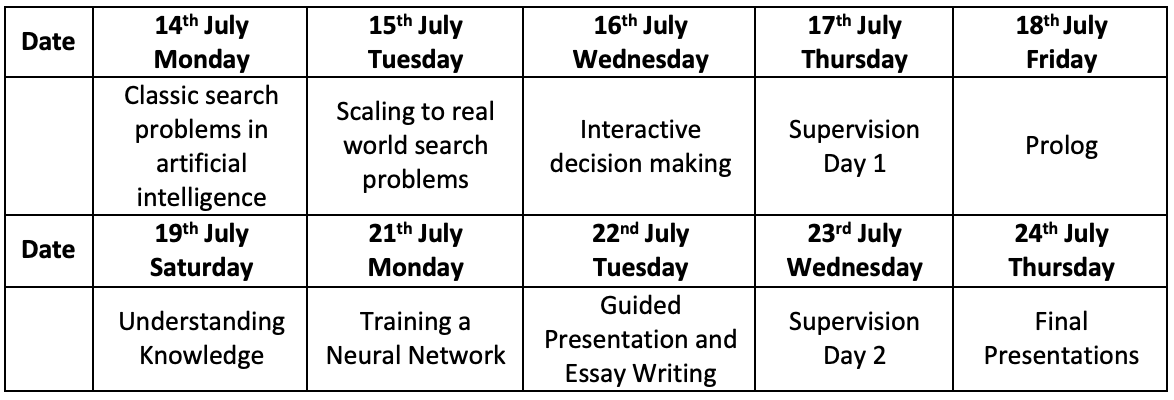
-
Philosophy of Science
Course Instructor(s): Dr Alex Carter
From Isaac Newton to Alan Turing, Francis Bacon to Stephen Hawking, Charles Darwin to Rosalind Franklin, James Fraser to Jane Goodall—Cambridge is renowned for its scientific breakthroughs. In this course, we explore the deeper, philosophical significance of these discoveries and ask: Is space a “stuff”? Are human beings “special”? Is mathematics certain? Can machines think? The course welcomes those new to philosophy, and invites students to apply their knowledge of other subjects in critical and creative ways.
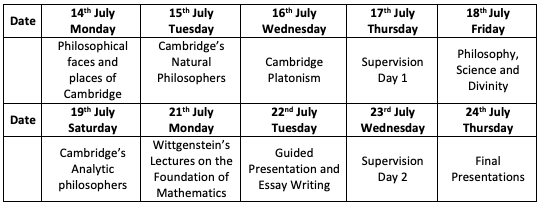
-
Future-Focused Robotics: Bridging Mechanical and Electrical Systems
Course Instructor: Dr Rachel Thorley
Robotics is rapidly transforming industries—from healthcare and manufacturing to transportation and entertainment—making now the perfect time to build the knowledge and hands-on experience this field demands. This module provides a comprehensive introduction to the electrical, mechanical, and control aspects of robotics, focusing on the design and prototyping of robotic systems. You will learn how to integrate electronics, mechanical structures, and control algorithms, exploring what is involved in the construction and use of robots from a multidisciplinary perspective.
Through a blend of lectures, hands-on lab sessions, and group design projects, you will discover how to select and assemble hardware components, program control systems, and refine prototypes based on performance testing. By the end of the module, you will be able to design, build, and troubleshoot simple robotic devices, laying a solid foundation for further engineering study and real-world applications. In addition, the module incorporates an essential thread on communication skills. You will gain experience in clearly and accurately presenting ideas in written, verbal, and graphical forms, ensuring you can engage effectively with diverse audiences—an invaluable skill in both academic and professional engineering environments.

Programme 2 (27th July-9th August 2025)
-
Business Economics - FULL
Course Instructor: Prof Christos Genakos
Business economics covers the economic foundations of managerial decision making. In this module, we explore the importance of economics and how it relates to our everyday lives. Our task is to develop familiarity with microeconomic models to better understand concepts such as costs, demand, profit, competition, pricing, compensation and market entry strategy and to acquire the more subtle ability to apply them to real and simulated situations with a focus on learning how to “think like a manager” applying this thinking process to improve managerial decisions.

-
Elements of Mathematical Economics
Course Instructor: Dr Vasileios Kotsidis
This course explores some fundamental notions and results that are of special importance of economic analysis. It begins by considering elements of set theory, analysis, optimisation calculus, and statistics. It then applies them to construct a series of progressively more elaborate logical statements which form the basis of formal choice under risk. The result is a robust and analytically tractable approach to reasoning about uncertainty.

-
Biology: Microbiology & Microbial Genetics
Course Instructor: Dr Ashraf Zarkan
Microbes are the dominant life-form on the planet; they have been around longer than anything else, and they are more numerous than anything else. In fact, it is no understatement to say that we are guests in a microbial world. In this course, we'll explore the microbial world and look at how our preconceptions are changing as a result of new discoveries. We'll see how microbes have a thriving social life, and how this is tied in with the propensity of some species to cause disease and the rising problems of antimicrobial resistance. Your Course Lecturer, Dr Ash Zarkan, hopes that his enthusiasm for the subject will be.... "infectious"!
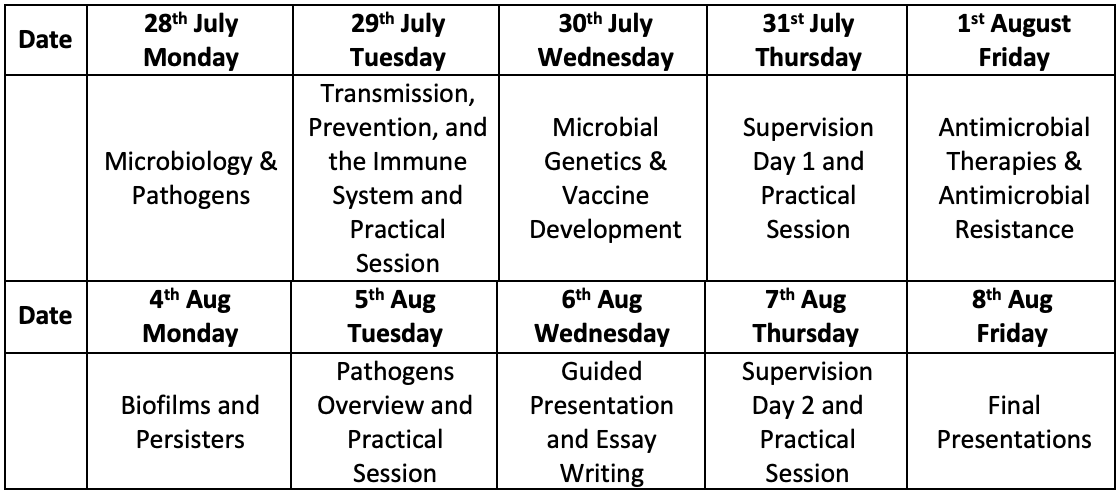
-
Medicine - FULL
Course Instructors: Prof Matthew Mason, Dr Aaron D'Sa, Dr Saeed Kayhanian, Dr Robert Abayasekara
The FitzEd Medicine course offers pre-university students an insight into medical science, current issues in healthcare and developments in medical technology. You will have the opportunity to extend your understanding of important topics in physiology and anatomy, discuss and debate important ethical issues, and even think about the design process for medical technology. The course will include small group teaching from experts, as well as sessions to guide key writing and presenting skills, and the opportunity to present your own project work.

-
Physics: Special Relativity and Quantum Mechanics
Course Instructor(s): Dr Joao Rodrigues and Dr David Homan
The motion of particles at speeds close to the speed of light is described by equations that are very different from those that we apply to study the motion of the objects in our daily life, such as the planets around the Sun. Special Relativity provides the theoretical framework to study those fast moving particles. We shall study phenomena such as the time dilation, length contraction and the famous twin paradox, which have no counterpart in the classical theory.
And let us explore the Quantum World. The atomic and subatomic particles behave in a way that for us, used to the certainties of Classical Dynamics and Electromagnetism, is unambiguously strange. Quantum Mechanics suggests there is an essential randomness in quantum phenomena and the best theory we have, based on the wave function and Schrodinger equation, can only predict the probabilities of events to occur. Such peculiarities of the theory were not appealing to everyone. We shall look at how Einstein objected to the standard formulation of Quantum Mechanics and how his ideas led to new developments.

-
Chemistry
Course Instructors: Dr Andrea Chlebikova and Dr Peter Bolgar
This course lets participants explore advanced topics in physical and organic chemistry, each of which are fundamental to your studies of a chemistry degree. The course is built on concepts that you will be familiar with from school curriculum. We will quickly extend your knowledge in the fields of atomic and molecular orbital theory, thermodynamics, kinetics and organic reactivity to give you a significant head start in your university education. You will be able to practice your experimental skills as well through a practical class in physical chemistry. We are looking forward exploring the highlights of first year undergraduate-level Chemistry curriculum with you!
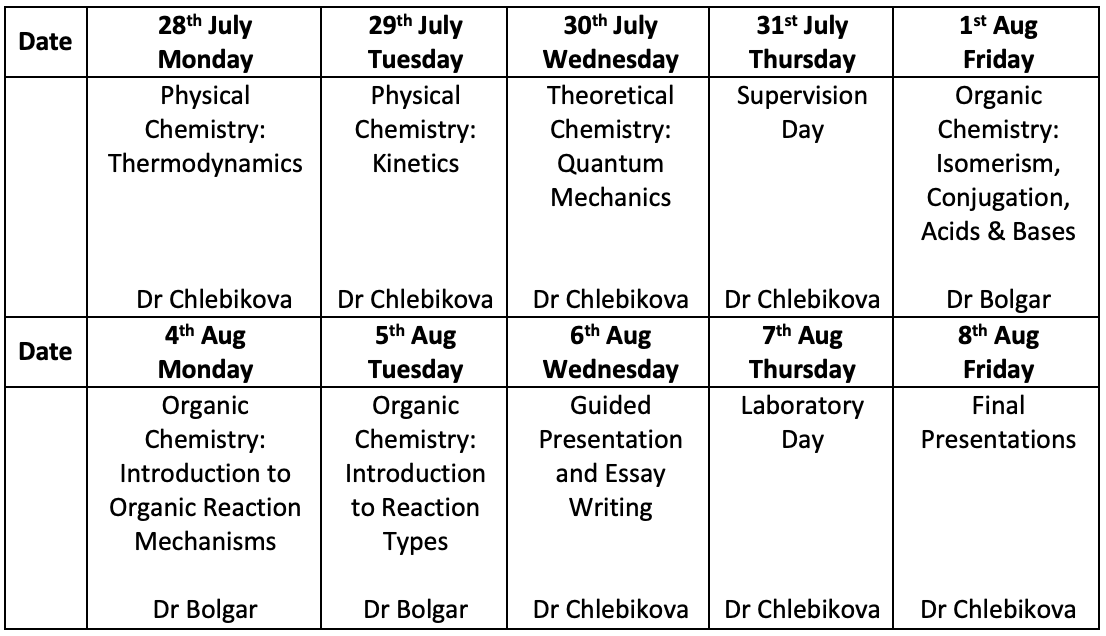
-
Computer Science: Cybersecurity
Course Instructor: Dr John Fawcett
We hear about data breaches at one company after another, of hacks, exploits, and companies' data being encrypted for ransom. What's going on? Why is everyone's security so easily defeated, and what can we do about it? This course looks at security on the Internet, security on mobile devices, and defensive coding techniques we can all use to write better software. We explore some techniques that can scan programs for vulnerabilities and we will see the tools used in industry today to manage risk in the cyber sector.

-
Mechanical and Electrical Engineering - FULL
Course Instructor: Dr Miles Stopher
Engineering has many branches, but the oldest and broadest is mechanical engineering. Mechanical engineers look at the design, analysis, and manufacturing of mechanical systems and machines that keep our world moving forward. Electrical engineering was born in the 18th century, known then as "the youngest of the sciences". Electrical engineers study electricity, electronics and electromagnetism, and their application in the design, development, and testing of systems. This intensive course offers a valuable insight into what it is like to study mechanical or electrical engineering at university, covering the most prominent specialisms within the fields. Students will study the foundational concepts on which such specialisms are built and apply them to real-world problems, acquiring the skills and knowledge necessary to gain a head start in studying engineering at university.
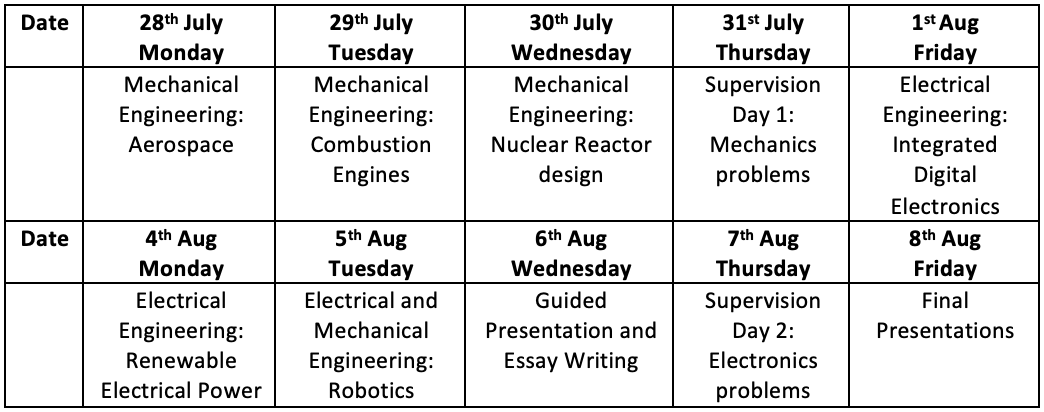
-
Mathematics for the Natural Sciences, Option 2
Course Instructor: Dr Serena Povia

-
Psychology and Neuroscience, Option 2
Course Instructor: Dr Zsofia Zavecz and Dr Katharina Zuhlsdorff
This course offers a comprehensive introduction to key areas of psychology and neuroscience. It begins with fundamental concepts and methods in psychology, followed by specialised topics such as electrophysiology and sleep research, memory systems, and higher-order cognitive functions. Students will also explore computational neuroscience, neuroimaging, and psychopharmacology, with a hands-on approach to problem-solving, essay writing, and research presentations. The program emphasises active learning through supervised sessions and group discussions, culminating in final presentations of individual research projects.
